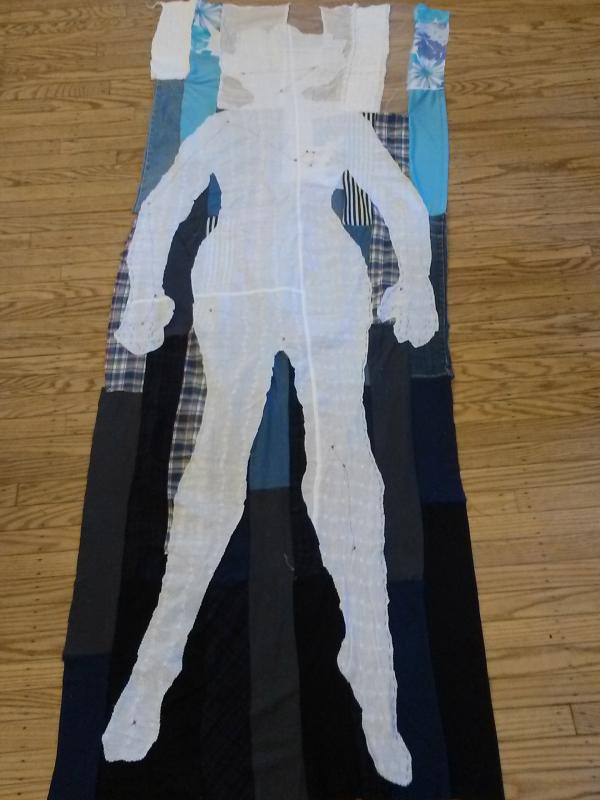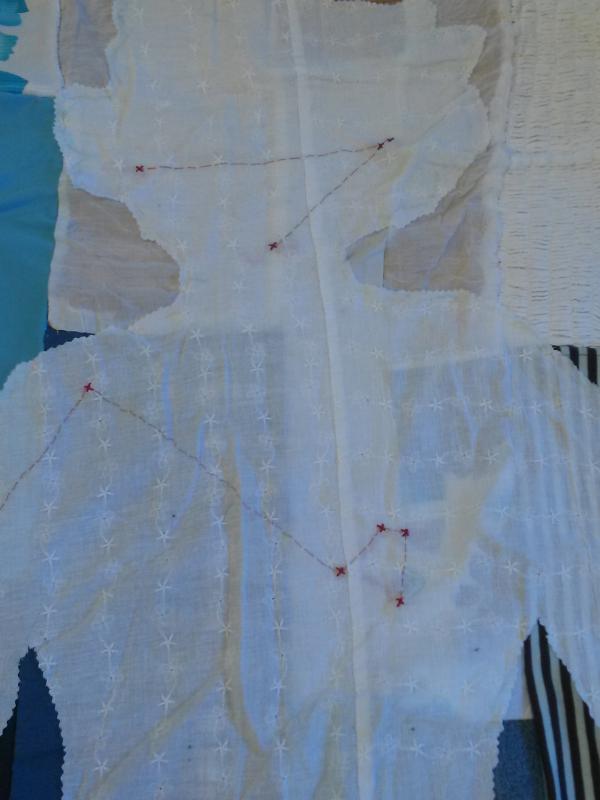Serendip is an independent site partnering with faculty at multiple colleges and universities around the world. Happy exploring!
Blogs

Quilt
I originally made this quilt for an art class while abroad. The theme of the class exhibition was mapping, and I decided to make that very personal and map my body. I chose the medium of quilting because my grandmother and great-grandmother both quilted and because of it's association with traditionally feminine crafting techniques. I wanted to disrupt and question traditional assumptions about feminitity – leaving the edges rough and patches unfinished.

The body on the quilt is a cut-out of my own body, and the red crosses embroidered into it mark some of my visible and invisible scars. I wanted to make visible my vulnerabilities and "flawed" spots, aspects of myself that tend to remain covered up, hidden, or silenced.


Praxis – Identity Focus Groups
My praxis placement is based on-campus, where I'm working to facilitate conversations about identity and perception of identity. The goal of the groups is to offer suggestions to the President's office to make changes on campus which will better support students from diverse backgrounds on campus. The week before break, I had the opportunity to co-facilitate a focus group for the first time, and just this week I facilitated my second group. It was a rewarding and challenging experience. I needed to figure out how to act as an engaged and active listener, while also guiding the participants to think critically about themselves, taking notes, thinking about broad themes, and coming up with follow-up questions to responses. It's a balancing act that I imagine is similar for teachers leading discussions –– who also need to recognize the themes their students are bringing up and challenge their students (and themself) to think more deeply about the content. I also have to be aware of my own positionality. Sometimes my identities overlap with those of the participants, but often they do not or they simultaneously overlap in some ways and don't in others. And even with overlap, opinions and experiences differ enormously. This experience has echoed my understanding of Ellsworth's theories on dialogue. However, it has also reinforced my belief that in spite of a necessary failure to ever entirely understand one another, dialogue with others is still important to and even necessary for knowledge building.
Inquiry Proposal--Bilingual Literacy Programs in Early Education
I want to look at bilingual literacy programs in early education (preschool and kindergarten). I’ve seen a number of approaches to literacy in early classrooms, from majority play to majority structured work on letter sounds and reading, so I’m interested in looking at the differences in programs, and especially how the programs in bilingual schools relate to the students’ and their families home practices and experiences with language. I’m interested in looking at how and which languages are privileged (or not) in these classrooms, and how this may vary depending on the teacher, the students, and the larger community. I think I would like to interview my placement teacher, who teaches at a preschool literacy program for mostly Spanish speaking kids, as well as some of the preschool and kindergarten teachers at the bilingual school I was working at last semester in Costa Rica. While I will mostly want to look at educational research from classrooms, there is also a fair amount of psychological research about the process of bilingual language development, and I’m thinking about incorporating some of that as well.

Inquiry proposal
I’m really interested in exploring different models of teaching and grading (specifically mathematics teaching) that can help foster motivation and deepen thinking about the subject matter. Math can be seen to be a very unbiased subject, with very few social factors coming into play into the classroom. Math also is often a troubling area for some students because there is very little connection to “real life” and students often do not see the importance in learning mathematics. Drawing on the idea that not all students learn and think the same, I would like to explore the implication of a project based teaching model in order to address different “types” of learners and create culturally relevant lessons for students. By assigning students tasks that they're personally invested in and are able to see the "point," they'll be more personally invested in their own learning and in turn, gain a better understanding of the subject matter.
inquiry proposal
I've always been really interested in how education can work in "different" environments (and I use different to mean deviating from the norm in some way, or having some special quality that is greatly linked to the way one would perceive/pursue an education there) and spending these last few weeks at my placement has really heightened that interest. There are many factors that need to be considered when working in a place that isn't a "typical" school environment, especially when the students/learners/people receiving the education are also not typical. (Some pop-culture examples I'm thinking of are the movie "Freedom Writers," in which a teacher starts a job at a school that has been recently racially "integrated" and is faced with the challenge of creating a cohesive class made up of students of many different (and often rivalling) backgrounds, and the movie "Precious," in which the main character is sent to an "alternative" school because of the way she struggles in her classes and is met with a tough but clearly social-justice-motivated teacher who supports her.) I'd like to focus specifically on the environment in my placement and how that affects the way one might educate in that space; how does one choose their methods, what does one need to keep in mind about one's own place in the larger structure of society when approaching learners in these "different" environments, what are the goals/aims one might have for these learners, how does one integrate the personal experiences of the learners without having it overshadow one's own educational purposes, etc.

Fiction and Anti-Racist Activism
For my inquiry project, I’d like to look more critically at anti-racist activism that has occurred at Bryn Mawr and similar institutions both historically and more recently. I’ve been feeling both inspired and charged by the #MoHonest movement currently happening at Mount Holyoke, as well as the support that Bryn Mawr’s zine for people of color – Leverage – has shown in solidarity with that movement. I’ve also been reflecting on the Perry House movement that occurred last year, and after reading two novels that both examined race in America and academia (On Beauty by Zadie Smith, and Americanah by Chimamanda Ngozi Adichie) I want to represent, examine, and critique activism movements by writing a piece of fiction about an anit-racist activist movement on a fictional liberal arts college campus. I imagine this will take the form of a short story, though I'm currently imagining the narrative form will be less of a straightforward narrative and more post-modern, involving fictional testimonials from a variety of characters related (deeply or marginally) to the movement – possibly along the lines of The Savage Detectives by Roberto Bolaño.
Inquiry Proposal
I would like to investigate methods to get underrepresented groups intersted in pursuing exclusive fields such as the STEM fields. By using my observations from my praxis placement at Adelante, I would be able to look into current practices in outreach to Hispanic middle school students in Norristown Pennsylvania. Some questions I will keep in mind are: what are the benefits of starting college preparation in middle school vs. waiting until high school?, How can we teach science in a way that is more accesible to a broader range of students?. From this information that I gather from my observations and outside research I will write a reasearch paper or ciriculum.
inquiry project proposal
For my project, I would like to look at the issue of culurally-biased questions on standardized tests and how they affect the scores of minority students. This question was sparked when I observed the 3rd-graders at my placement reading the book "100 Dresses", a book I had read in my own 3rd grade class. This book was written in the 1940's and is about a white girl being teased by her classmates because she is poor and wears the same dress to class everyday. The students had trouble remembering the old-fashioned, traditionally white names, such as Peggy and Maddie and struggled with words in the book that had no relevance to their lives. I then called my sister about this and she told me that her urban students struggled with the questions on standardized tests because of their cultural bias. She gave an example of the question "What color is a banana?". Though the answer may seem obvious, some students who are poor may not have access to fresh fruit or what they do have is not ripe, so they may say a banana is partially brown. Some students may be used to plantains instead, so they would say that a banana is green.

Inquiry Project: Using Teacher Practitioner Research to Promote Multicultural Educational Values and Practices
For my inquiry project, I want to research how teachers are using teacher practitioner research to further explore multiculturalism in their classrooms and to promote multicultural, social justice oriented values. My curiosity in teacher practitioner researc has been developing more broadly for many months now. For a long time, I was extremely passionate about applied education research. I love qualitative research and education but I was more interested in exploring these interests in a non-profit policy-level setting, as opposed to in the classroom. This past school year, particularly after taking the "Curriculum and Pedagogy Seminar," which is the teaching methods course, I developed a much more serious interest in being a classroom teacher. I believe that that teacher practitioner research wonderfully fuses these interests of mine in research, education, and teaching.
In particular, I am interested in reading books and articles about teachers who are using teacher practitioner research to promote multicultural teaching. I want to learn 1) How people are doing/using this research; 2) What they are finding; and 3) Why this matters/how this method is useful for promoting multicultural work.



